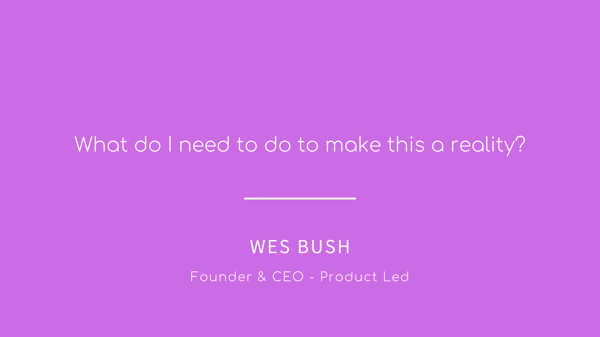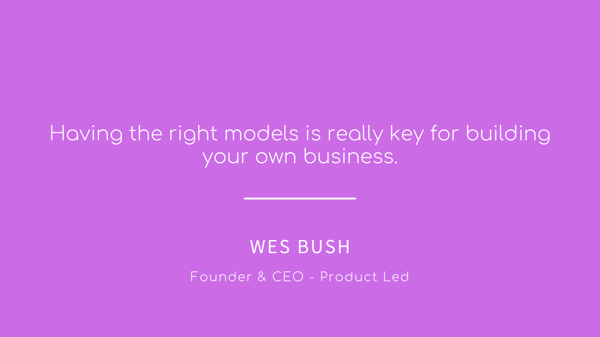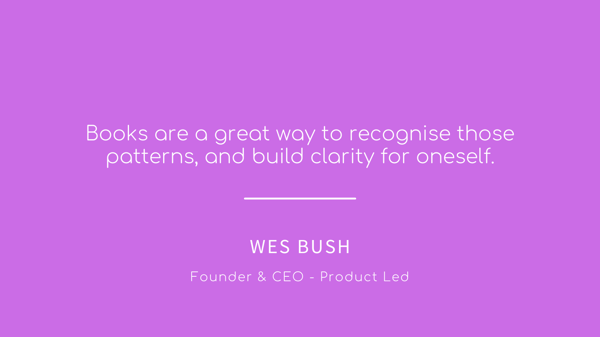Net Positive Growth, Gonçalo Henriques
The Net Positive series expands to tell the story of a growth leader, Gonçalo Henriques, his growth journey, both ups and downs.
Wes Bush provides plenty of insights into this career growth and how to follow your energy to be led down your best path.
Wes Bush is the Founder and CEO of Product Led. He’s the author of the bestselling book
Product-Led Growth. Wes is a big believer in leading with your product and allowing your audience to judge whether you fulfill the promise that your product offers. Product-Led Growth, to Wes, is making a genuine business strategy from this change of perspective. Wes Bush’s secret to success is to follow your energy, it’ll lead you down your best path.
Wes noted that the pivotal moment for his growth journey was when he was fired. This change led to a real re-evaluation of his career journey. He had offers that he could’ve easily snapped up, but another voice was calling him to start something on his own. He decided to take the chance on himself, even while doubt and fear may have questioned him as to whether it would all work out. Making the decision, and really trusting himself built confidence as it reinforced that he was capable of what he put his mind to.
When speaking to Wes, he noted that there are often two mindsets when it comes to following a passion or starting a new venture. The first is the dreamer mindset, and Wes loves dreamers. The second mindset is dreaming and doing, they’re dreamers who go out and chase their dreams. They start. They’re action-oriented. They don’t just talk about one day starting their own business, they go through the process and make decisions aligned with the idea.

When looking at the people that Wes had around him, many of them were in the dreamer category but were yet to begin doing. He was living and working in Waterloo in Canada, the tech capital. He was surrounded by entrepreneurs and business people, yet wasn’t connecting with them as much as he’d wanted to. It didn’t feel like they were his kind of people.
For Wes, he needed to be somewhere else. He changed that circle to better improve his chances of continuing to work on his business. Within the first 10 months of the business, he moved to Thailand, where he found the people with who he resonated. His goal of having a truly location independent business was being realised.
To make that jump, to dive into the risk of running your own business you need to surround yourself with top-tier people. At the beginning of his time in Thailand, he did find there were some founders who were surviving but not thriving. Later, at a conference in Bangkok, he found his tribe. The people were ambitious, but they were still just like Wes.
When you can see and speak to someone, and they’re hitting these big achievements or milestones it’s so inspiring. More often than not, they were happy to speak with Wes, break down their models and their reasons for success. They would provide the reassurance that it is possible.

The first month of making the decision to start his own business challenged Wes the most, from a fear perspective. This was partnered by an offer that he had turned down where he would be paid double what he was previously earning. Quite the opportunity cost. Wes had to make this work.
Wes spoke about the liberation and confidence that a sense of direction provides. When running towards something, fear doesn’t seek you out. Fear normally appears when you’re running away from something.
The desire, or the carrot that Wes pursued, was building a location independent business. He knew that there were risks, and it was scary, but it helped knowing that he was headed toward something.
One morning he was in a pool, staring at the mountains and he thought to himself:
“I kinda did it, it was easier than I thought”
This goes back to confidence and self esteem. When you take the swings, you occasionally make contact. The contact inspires hope, you consider that your goal is possible. You may even realise that you’re capable of more, and can set your goals higher.
In terms of low moments, there were many. One in particular though was when Wes was doing consultancy work, an area where he excelled. The issue that he realised far too late was that he wasn’t enjoying the work he was doing. He created a worse job for himself, despite the incredible success he was having with the work, he wasn’t excited to go to work.
He didn’t have any energy. Energy is a big deal for Wes. To him, it is one of the best north stars to follow. Wes believes that you need to find something that will mean you’ll outwork people. He sought success by following his energy, and that led him to developing the MOAT framework, writing his book and doing his own podcast.
Writing his book was an interesting experience for Wes, he found that he writes to better understand something. The book offered him the chance to learn more about the process, as there wasn’t a methodology that existed at the time. When working, he knew how to help but his book offered a platform where he synthesised all that he knew. The book empowered people to be more consistent and follow patterns toward success.

For Wes, the book writing improved his ability to help others when it came to operation on a larger scale.
Wes definitely recognised the value of having family and close friends when he faced low moments. He also noted they were not always well equipped to help him or offer advice, as their experience didn’t match his new location independent business. For Wes, it wasn’t necessarily that he would reach out to those who he looked up to, but rather followed the models that they were implementing.
There was even a limit as to how much his friends and family were able to emotionally support him, as he was on the other side of the world. The time zones and distance did impact him, but never overly so. As a consultant, there are calls you’ve got to take, so his normal schedule was from 9am to 11pm. Keeping up energy for that long was difficult for Wes.
Life for Wes still involves plenty of work. There was one book that helped a lot, and that was The Power of Full Engagement, which really shaped his perspective of following one’s energy. The book explores how elite athletes take their rest and recovery just as seriously as their high-performance modes. In many workplaces, this mentality or importance of recovery is not shared.
This has led to Wes scheduling breaks. His breaks offer the chance to maintain that high performance. At 10:30, at midday, he ensures that he has a small break. An activity that will help space out the day a little. His breaks often feature something that lights him up, something that recharges him so that he can return to work after the break with great drive and intensity. Wes suggests that you plan fun stuff, and ensures that each day has a highlight activity that he plans on the previous Sunday. The activity means he’s excited about the day ahead, waking up with a purpose and joy.
During Wes’ evenings, he plans the next day, starting with the 3 outcomes that he’s going to work on. He ensures that from 9am to midday that he’s approaching those 3 critical outcomes. Structure helps him. Another helpful addition to Wes’ routine is to go to the gym, getting that hit of dopamine and treating his body right. Pre-covid it was also a chance to connect with people
As far as sleep is concerned, if Wes doesn’t get 7-8 hours, he will be off his game. It’s a major priority for Wes to sleep well.
The advice from Wes, in becoming a doer, rather than a dreamer, you need to find something that is going to draw you in. Something that is worth fighting for, going through difficult times, hurdles and navigating tough territory. If that business, that idea is truly the right motivation or carrot for you, it will make the entire process much easier. The quicker you chase after that true motivation, that desire, that energy, the sooner you realise you’re capable of a lot. This will lead to a brilliant question, what else are you capable of?
Momentum was another point that Wes touched on. Sustain and grow your momentum. There will be times where you need to change tact. At one stage Wes was doing customer research for an SEO AB testing product, it was great on paper, checking plenty of boxes. The drawback? It didn’t give him energy, these weren’t his people and he was just going through the motions.
He journaled out what he was going through at the time, and noted that he was working really hard but not really getting anything from it, his effort wasn’t the issue, the subject was.

As mentioned above, Wes journals. He treats the process as windshield wipers of the morning, he clears the screen. When he approached writing his book, the structure and style of writing was completely different. For 4-5 months he was working from 9-12 on just book writing. Wes found that dedicating the time for it is a helpful thing, then set yourself a tough deadline.
For the community, Wes has to maintain a high level of energy. Often he loves that about the community and the work that he does. When he does notice that maybe he’s running a little lower than normal, he doesn’t push himself, rather he investigates. He looks at why he possibly has been off. Wes looks at life as a marathon, it’s definitely not a sprint.
To do this, he ensures that he’s not wasting his time on low energy or low value tasks. He instead focuses on what lights him up, finding the coal burning sources of energy in his life. Once he’s removed those, he can go nuclear, and going nuclear is really beneficial.
As far as Product Led Growth is concerned, he didn’t really start out building a community, he didn’t set out to be a leader. This was something that took form by itself. Similar to when he was working in Thailand, this community was about helping people find their tribe. Wes wanted them to have a place where they could connect, have better interactions and solve problems together.
Wes is an incredible force with high energy and is a trailblazer in the product led growth space. He joined the Net Positive Podcast and spoke about his strategies, his moving the needle perspective and the traffic light onboarding process.
Like Wes, here at Upflowy we want the customer to be experiencing the value of the product as soon as possible. We achieve that through a sign up flow builder which informs your potential users, keeps them engaged and better increases conversion process between CTAs and signups.
The Net Positive series expands to tell the story of a growth leader, Gonçalo Henriques, his growth journey, both ups and downs.
Jay Desai is a really gifted founder, who's one pearl of advice is to spend more time validating than ideating.
Andrew Davison's growth story highlights his ability to seize any opportunity and walking his own path to success.
Upflowy makes building forms for your business easy, a drag and drop tool to create engaging and enticing experiences with your potential customers. Whether it be a booking form, a feedback survey or a fun quiz, you'll see the results flood through.
Not only is it easy to bring into your website, but you can connect it to the apps your business use so that all the answers are in the right place.